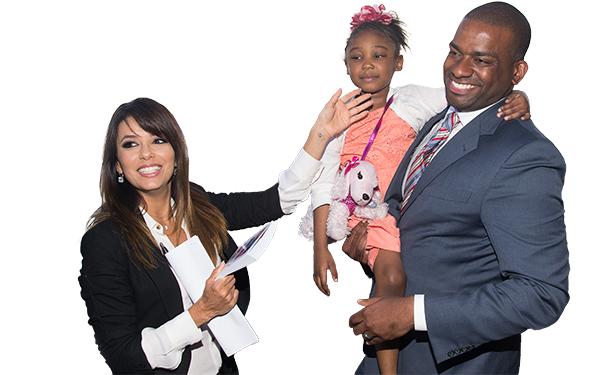Shavar Jeffries’ Breakthrough: What Newark Politics Taught Him About Taking Ed Reform National

Roseland, New Jersey
Jeffries, considered a longshot candidate from the start, fought through a vicious campaign in which he embraced school choice and charter school expansion at a time when the state-appointed Newark schools chief was being castigated for implementing such reforms.
By contrast, his opponent, then-South Ward Councilman Ras Baraka, took a hardline stance against former Superintendent Cami Anderson and her reform plan, One Newark, which had become political kryptonite in the city. Baraka won by some 3,000 votes, prompting some of Jeffries’ ardent supporters(and even his opponents) to conclude that if backing those reforms didn’t cost him the election, it certainly didn’t help.
But Jeffries’ career following the twin paths of politics and ed reform didn’t end on election night. This month, Democrats for Education Reform announced the 40-year-old lawyer would take over as president, replacing former journalist Joe Williams.
Jeffries, who has already survived enough personal and political battles to fill a memoir, takes the helm of DFER at a time when the education reform platform is flying into the headwinds of a hostile political atmosphere.
Washington’s Supreme Court just ruled its charter schools unconstitutional; the federal government’s role in mandating accountability and setting standards is under the gun in the No Child Left Behind rewrite; and parents in some parts of the country are in open rebellion over standardized testing, the Common Core and student data collection.
“I think it’s an inspired choice. I think he is going to be a terrific leader for an organization that has its work cut out for it,” said former Louisiana Sen. Mary Landrieu, who met Jeffries at a DFER event just a few weeks ago. Landrieu is an advisor to Education Reform Now, a DFER-affiliated advocacy group.
In an interview with The Seventy Four last week at his Roseland law office, Jeffries said his career in New Jersey’s largest city has given him a keen understanding of both the potential of school choice, charter schools and funding equity and the missteps education reformers often make around political organizing and messaging as they seek to transform public education.
“I was very excited about the opportunity because I believe this is the civil rights issue of our time,” he said while sitting at his desk in a checkered blue shirt. “I believe passionately that we have to build on what’s worked in the traditional system and change the things that have not worked.”

Jeffries’ climb from an impoverished and tragic childhood to the halls of the Ivy League are the stuff from which education-reform success stories are made. Born to a 19-year-old single mother in 1975 in Newark, he shuffled among various relatives in the New Jersey area every few years. By age 9, Jeffries’ mom moved them across the country to North Hollywood, California.
She became involved with a man who grew increasingly violent, smacking and hurling her across the room when he spotted unfamiliar numbers on her phone bill; kicking in the door to their apartment and dragging his mother into the street, stopping only after she was able to flag a passerby.
Shavar’s mother, Donna Johnson, would get restraining orders and eventually moved the family to a shelter and later to another neighborhood. But on Nov. 25, 1985, the estranged-husband went to her job and shot Johnson to death with a sawed-off shotgun. Police officers looking for him would later bust into Shavar’s new home and relay the horrific news.
"It was really sad for me," he said, remembering how he felt after the move and then after the tragedy. "Really excited — it's me and my mom now, I can finally be with my mom and kinda begin the rest of my life. But not even a month or two later…"
Jeffries moved back to Newark, where he lived with his grandmother who put him in a summer camp at the local Boys and Girls Club. There a school counselor helped get him a scholarship to Seton Hall Preparatory School in West Orange, New Jersey.
The scholarship marked a new chapter in his life. At Seton Hall, Jeffries said, he was encouraged and groomed to attend a competitive college. Though no one in his family had graduated from college, Jeffries said the school’s environment of challenge and expectation ensured his path to higher education.
“It truly changed my life,” he said. “I was prepared to go to competitive universities. No one in my family graduated from college. College wasn’t anything on my mind because that wasn’t something that I saw.”
But while Jeffries began thinking about college, his friends in Newark “weren’t talking about the same things I was talking about.”
“At that young age, I knew something wasn’t right”, he said. “Something wasn’t right about what’s going on in our society and what’s happening in our schools.”
Jeffries would go on to earn his bachelor's degree from Duke University and his law degree from Columbia Law School. While there he worked as a summer associate for the NAACP Legal Defense and Education Fund. He continued civil rights work as an associate with Washington, D.C.-based Wilmer Cutler & Pickering where he helped defend the University of Michigan law school against a challenge to its affirmative action policies.
After he moved back to New Jersey, he worked with the Education Law Center to successfully challenge Newark Public Schools’ implementation of individualized education plans for special needs students. The district was improperly withholding services.
Later, he was a law professor at Seton Hall Law School, where he brought an action against the state’s funding formula for public charter schools, prompting New Jersey’s decision to allow urban charter schools access to the same supplemental money given to nearby public schools.
“I had been doing education reform work for really my whole career,” said Jeffries, who is married and whose two children attend a Newark charter school. “Even before there was something called education reform, I was doing it.”
In 2002, he worked with current charter school network leader Ryan Hill and became the founding board president of TEAM Academy Charter School in Newark. A 2012 Stanford study concluded that charter school kids in Newark gained an additional seven-and-a-half months in reading instruction and nine months in math over their public school peers.
Jeffries said he saw Newark as a textbook example of how more money doesn’t necessarily solve poor performance. New Jersey civil rights activists in the 1990s had successfully fought in court to force the state Education Department to give more money to urban school districts beyond what property taxes provided.
“Sure poverty is a challenge….Sure we’ll always fight to get more funding and resources for our kids but when those kids go through those doors you need to be ready,” he said. “These kids can learn now is my view. I was one of them.”
“We got all this money but then the results aren’t moving,” Jeffries said of the Newark’s public school system. “While those results aren’t moving, we have Team Academy which, year after year, is growing and we’re kicking butt.”
After a stint as an assistant attorney general under former Gov. Jon Corzine, Jeffries decided to run for the Newark Public Schools Advisory Board in April 2010. He was later appointed to chair the board, where he championed charter schools.
Months after his election, former Newark mayor, now U.S. Senator Cory Booker and Gov. Chris Christie announced a $100 million grant from Facebook founder Mark Zuckerberg with another round of matching donations for Newark Public Schools.
“That’s when everything blew up,” Jeffries said. “That said to those who are more traditionally minded, we better wake up, that these are folks are serious now.”
The tumultuous educational politics in the city over the next five years, Jeffries said, gave him a lesson in some of the pitfalls of the modern education reform movement. Anderson, the new state-appointed schools superintendent, would usher in a slew of reforms, including a teachers contract that awarded merit-based bonuses, a lottery enrollment system that expanded school choice, several high-profile principal changes and the expansion of charter schools.
But by the time the 2014 mayoral election came around, Anderson faced intense opposition not only from the local teachers union but also the city’s political establishment. Protests were more frequent and got more media attention. Board meetings became even more unruly than usual, until Anderson announced she would no longer attend them. Adding fuel to the political fire, Christie regularly dismissed Newarkers’ complaints by emphasizing that he was the “decider” of the state-run school district.
Jeffries said while he thinks Anderson’s reforms helped kids, the district “made missteps” when it came to engaging the community and working with parents.
“She did not have the support,” he said. “There was absolutely not an infrastructure to communicate to parents, to communicate to voters, to communicate to the community.”
The contentious politics in Newark mirror the challenges faced by DFER and reform organizations nationwide. While DFER saw support for its agenda from President Barack Obama’s Race to the Top initiative, so far the 2016 Democratic presidential hopefuls have not been vigorously waving the ed reform flag and Hillary Clinton locked up a very early endorsement from the American Federation of Teachers union.
During his bruising mayoral bid, Jeffries’ opponents sought to cast him as a puppet of Wall Street, out to exploit and privatize the urban school system for profit — an accusation that could easily follow him onto the national stage.
In local elections, opposition groups have successfully faced off against candidates with reform-minded policy agendas even when those politicians are better known and better funded. (Just months ago, Chicago Mayor Rahm Emanuel was embarrassingly forced into a runoff election in part because he tangled with the teachers union.)
Meanwhile, civil rights groups are openly worried that Congress will ultimately gut NCLB’s accountability and testing requirements that shined a spotlight on the achievement gap between white, affluent and middle-class students in America and low-income students of color.
Landrieu said reform groups must negotiate challenges coming from both the left and the right. While some in conservative circles are suspicious about the role of the federal education department and the “good work the department has done to implement reform,” those on the left face pressure from the unions who don’t often see common ground in the reform movement, she said.
“I think DFER has to remind Democratic elected officials that we are the party of free, public excellent education,” Landrieu said. “We shouldn’t concede that ground ever by accepting a status quo that is indefensible.”
Jeffries said he isn’t naive about the power dynamics. As president, he said he plans to focus DFER’s efforts on reclaiming the progressive narrative around education by emphasizing that the Democratic Party has long stood up for the poor and minorities and should do so now through education reform.
He also said the group will better emphasize a “bottom-up” political organizing model. While unions and other organizations have long had established networks in local communities to telegraph their platform, Jeffries said reform groups don’t have the same kind of infrastructure. He added that DFER will focus not just on getting change-oriented politicians elected, but also helping them sustain attacks to reform once they are in office.
The disparity in organizing power between reform champions and those that opposed it was clearly evident in Newark over the last few years, he said.
“You can’t sustain a movement like that in a democracy in that way,” Jeffries said. “What we have to do in places like Newark and throughout the country is we have to begin to reduce that imbalance.”
And Jeffries said DFER isn’t giving up on championing reform in the 2016 presidential election or in the new K-12 federal education law. The results of its advocacy efforts in Washington likely won’t be known until next year as lawmakers work to get other policy issues off their plates. Until then, the fight for reform continues.
“I’m beyond excited,” Jeffries said. “Fired up, ready to go.”
Top photo by Getty Images
Get stories like these delivered straight to your inbox. Sign up for The 74 Newsletter

;)
